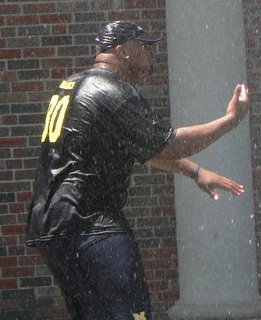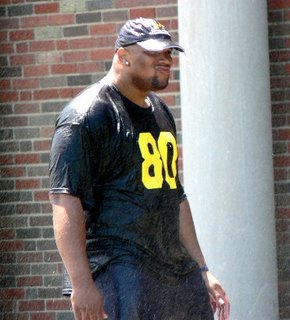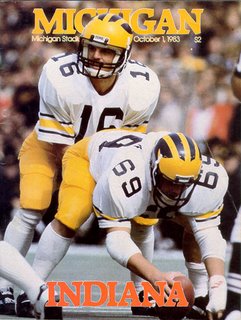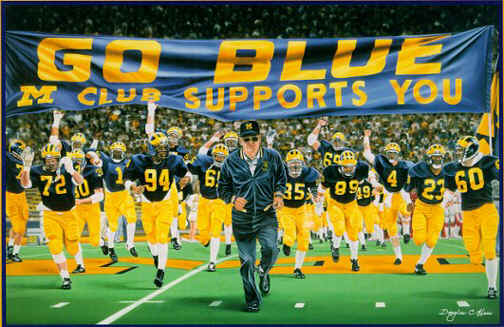The 1972-1974 seasons were some of Bo's most successful seasons but they were also some of his most frustrating during his 21 year tenure as Head Coach at U of M. The Wolverines were a remarkable 30-2-1 during those three seasons. They tied for the Big Ten Championship each of those seasons yet they did not earn a bowl bid during this time frame. Prior to 1975, the Big Ten Conference had a rule that one conference champion would go to the Rose Bowl while every other team would be ineligible for postseason bowl games. As it worked out, Co-Big 10 Champion
Ohio State went to the Rose Bowl game each season from 1972-1974 and U of M was left out in the cold.
The
1972 team tried to pick up where the 1971 team had left off. The '71 Wolverines had a perfect 11-0 regular season record. The '72 team featured a new QB in Dennis Franklin and the tandem of Ed Shuttlesworth and Chuck Heater in the backfield. The season got off to a slow start as U of M struggled to beat Northwestern 7-0 in the season opener. Game two was a night road game against UCLA at the Rose Bowl Stadium. UCLA's QB was Mark Harmon the son of Michigan Heisman Trophy Winner Tom Harmon. Despite the fact it was playing in its first night game in 28 years and the fact that it had lost two games in a row on that field (the '70 & '72 Rose Bowl games), U of M beat UCLA easily by the score of 26-9. In fact, the nine points the Wolverines yielded to the Bruins in this game would be the most points it allowed any opponent during the first 10 games of the season.

U of M proceeded to go 10-0 in 1972 heading into the final regular season game showdown with Ohio State. OSU pulled ahead 14-3 in the third quarter when freshman sensation (and later two time Heisman Trophy winner) Archie Griffin scored on a 30-yard touchdown run. However, U of M battled back to 14-11 in the fourth quarter. An interception by wolfman (that is what they called his position back then) Randy Logan gave U of M a shot to take the lead. The offense drove to the 1-yard line where on 3rd and 1 tailback Harry Banks was stopped just short of the goal line. Rather than go for the tie, Bo opted to go for it on fourth down. He called for a QB sneak but Dennis Franklin couldn't get in and OSU won 14-11. With no bowl bid, U of M finished the year 10-1 and with the #9 ranking.
In
1973, the Wolverines ran the table of their regular season schedule leadin

g up to the final clash with OSU. U of M entered the game at 10-0 and Ohio State was 9-0. This game marked the second time during the Bo/Woody era that both teams entered the game undefeated. In a classic,
the teams battled to a 10-10 tie. However, during the game Michigan's QB Dennis Franklin suffered a broken collarbone. Because of the tie, the decision regarding which team should be sent to the Rose Bowl was left up to the Big Ten Athletic Directors. (Note: There was no elaborate tie-breaking procedure as there is now). The Athletic Directors voted 6-4 to send OSU to the Rose Bowl citing Dennis Franklin's injury as a reason that U of M would not be as competitive. Consequently, although U of M was co-Big Ten Champion, it stayed home again as it did not go to a postseason bowl. U of M finished the year ranked #6 in the polls with its 10-0-1 record.
The
1974 team reeled off ten victories to head into the annual showdown with OSU with a 10-0 record and the #3 ranking. In fact, this was the fifth consecutive season that U

of M had won their first nine games of the season. U of M was eager to return to the Rose Bowl after the debacle of the previous season. #4 OSU had other ideas, however, and everything came down to a last second field goal attempt. OSU was leading 12-10 with :18 seconds left in the game when U of M set up for a 33-yard field goal attempt for the win. The kick missed and U of M was left with another co-championship while OSU went to the Rose Bowl for the third consecutive year. U of M's record in 1974 was 10-1 and they finished #3 in the final AP poll.
The 1972-1974 seasons. They were the best of times, they were the worst of times. It is hard to argue against a 30-2-1 record over 3 seasons with 3 co-Big Ten Championships. However, it was the near misses and questionable decisions by Conference officials that make memories of this era so frustrating. Things got better in the mid to late-70's, however, thanks in large part to a QB from Flint, MI who wore #7. Stay tuned. The saga continues...
Labels: 1970's Michigan Football
 The 1976 team was a dominant squad and was ranked #1 in the nation for most of the season. The Wolverines began the year ranked #2 but after posting a 40-27 victory over Wisconsin in the season opener U of M ascended to the #1 ranking in the AP poll. The Wolverines offense featured sophmore sensation Rick Leach at quarterback, Heisman Trophy candidate Rob Lytle at running back, All-American Jim Smith at wingback, and All-American Mark Donahue at offensive guard. The defense was led by tri-captain and All-American middle linebacker Calvin O'Neal. As the #1 team in the nation, the Wolverines rolled to an 8-0 record. In those first eight games, U of M scored at least 31 points in each contest and the defense shut out the opponents in four of those first eight games. However, a tough 16-14 road loss to Purdue in the ninth game dashed U of M's dreams of an undefeated season and the National Championship.
The 1976 team was a dominant squad and was ranked #1 in the nation for most of the season. The Wolverines began the year ranked #2 but after posting a 40-27 victory over Wisconsin in the season opener U of M ascended to the #1 ranking in the AP poll. The Wolverines offense featured sophmore sensation Rick Leach at quarterback, Heisman Trophy candidate Rob Lytle at running back, All-American Jim Smith at wingback, and All-American Mark Donahue at offensive guard. The defense was led by tri-captain and All-American middle linebacker Calvin O'Neal. As the #1 team in the nation, the Wolverines rolled to an 8-0 record. In those first eight games, U of M scored at least 31 points in each contest and the defense shut out the opponents in four of those first eight games. However, a tough 16-14 road loss to Purdue in the ninth game dashed U of M's dreams of an undefeated season and the National Championship.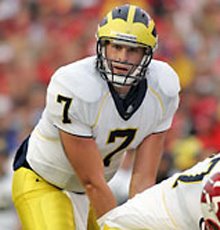
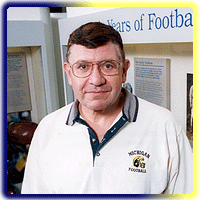
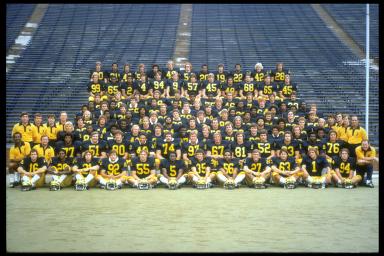



 g up to the final clash with OSU. U of M entered the game at 10-0 and Ohio State was 9-0. This game marked the second time during the Bo/Woody era that both teams entered the game undefeated. In a classic,
g up to the final clash with OSU. U of M entered the game at 10-0 and Ohio State was 9-0. This game marked the second time during the Bo/Woody era that both teams entered the game undefeated. In a classic,  of M had won their first nine games of the season. U of M was eager to return to the Rose Bowl after the debacle of the previous season. #4 OSU had other ideas, however, and everything came down to a last second field goal attempt. OSU was leading 12-10 with :18 seconds left in the game when U of M set up for a 33-yard field goal attempt for the win. The kick missed and U of M was left with another co-championship while OSU went to the Rose Bowl for the third consecutive year. U of M's record in 1974 was 10-1 and they finished #3 in the final AP poll.
of M had won their first nine games of the season. U of M was eager to return to the Rose Bowl after the debacle of the previous season. #4 OSU had other ideas, however, and everything came down to a last second field goal attempt. OSU was leading 12-10 with :18 seconds left in the game when U of M set up for a 33-yard field goal attempt for the win. The kick missed and U of M was left with another co-championship while OSU went to the Rose Bowl for the third consecutive year. U of M's record in 1974 was 10-1 and they finished #3 in the final AP poll.